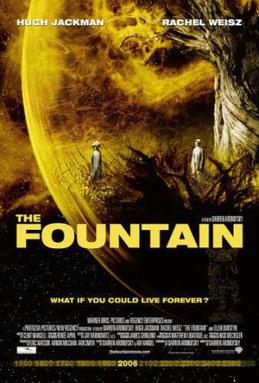 This is a valuable film. What gives it its value is the pure artistic emotion. I don’t have to fully agree with an artist to enjoy his craft if the underlying message is reasonable to my timid ears. And Aronofsky gives us both a message worth listening to (if slightly misguided and incomplete) and art that simply must be absorbed by anyone who dares to call himself a connoisseur of film. Aronofsky is a modern day Kubrick with about 500 percent more relevance.
This is a valuable film. What gives it its value is the pure artistic emotion. I don’t have to fully agree with an artist to enjoy his craft if the underlying message is reasonable to my timid ears. And Aronofsky gives us both a message worth listening to (if slightly misguided and incomplete) and art that simply must be absorbed by anyone who dares to call himself a connoisseur of film. Aronofsky is a modern day Kubrick with about 500 percent more relevance.Many movie geeks have been waiting years for The Fountain to hit the screen. Aronofsky was first put on the map with his psychological and eccentric thriller Pi and it was followed up by the brilliant yet provocative Requiem for a Dream. That got him enough bragging rights to rope in Brad Pitt for the lead role in The Fountain, but Pitt split and the budget took a hit. So what we have now is a $35 million masterpiece with one of the better young actors working today, Hugh Jackman, along with Aronofsky’s wife Rachel Weisz and veteran actress Ellen Burstyn, who could make a burp fascinating. Weisz manages well and Burstyn makes her short appearance well worth it, but Jackman deserves best actor this year. He came to the nation’s attention in his roles in the silly/dark Van Helsing and as Wolverine in the X-Men movies, and has only now begun acting in more mature roles as in The Fountain and The Prestige.
Ok, what is The Fountain about? Ultimately, it’s about how we as humans deal with death, and additionally, how we should deal with death. Let me just tell you his message right off the bat: some of us can get so caught up in avoiding death that we miss our opportunity to live with the time that we have, and our quest for immortality may only destroy our humanity. There…isn’t that nice? Yes, it really is. And the message comes through quite powerfully. To me, a filmmaker that can say something relevant and true to our culture and do it in an artistic and original way is worth their weight in gold.
There is a husband and a wife, Tom and Izzi (Jackman and Weisz). They love each other deeply. Izzi is dying of cancer. Tom is a neurosurgeon and is trying desperately to find a cure for his wife’s tumor. But he is so madly driven in this quest that he is missing time with Izzi, who is content to die and burdened by her husband’s foolish quest. The foolishness of the quest is not its impossibility, but its untimeliness. That’s a point that his boss (Burstyn) tries to knock into his head unsuccessfully when she first tells him to go spend time with his wife instead of in the testing labs and second goes to visit his wife herself. From this previous description, it should be no surprise to you that these moments afford many opportunities to flail one’s acting chops, and they all do it potently. In retrospect, the prideful Pitt could have never made himself vulnerable in the way that Jackman does here. Pitt is a good actor and a very entertaining one, but he is too in love with himself to take a role like this.
While hubby is trying to be a hero, Izzi is writing a novel, “The Fountain,” which is the story of a conquistador (also Jackman) who is on a quest for the queen (also Weisz) to find the tree of life as told in the Genesis account. These scenes are interspersed throughout the movie, and the transitions and connection points with the main story thread are the delightful things that make Aronofsky such a unique filmmaker. This book becomes the wife’s outlet for reaching her husband as she hands him the unfinished book and asks him to write the last chapter himself.
What we finally have is a story of a man and a wife with past and future intersecting. We have a unique filmmaker at his best with a message that is relevant and agreeable and helpful. It’s not perfect, but well worth seeing.
Number Three’s Score:
Mouthspeak (impact of dialog): +8
Watchfeel (impact of visuals): +16
Mouthfeel (overall watchability): +12
2 comments:
Sounds really good to me. From the first preview I saw of The Fountain, I've wanted to see it. But, I guess I can't see EVERY movie in theatres.
But it sounds even better than what I expected. I'll try to check in after I see it.
That sounds very intriguing, I also like the point about getting so caught up in something that you miss out, I found the same thing with Stranger than Fiction.
Post a Comment